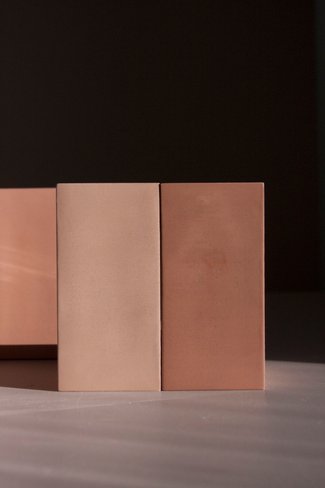project
Within the Oer project we investigate various applications of iron ores for ceramic products.
The iron comes from various sources. Collected as residual raw material from water production companies in the Netherlands or found in Swedish forests. Places where iron comes to the earth’s surface through water flows.
This natural raw material is processed into a usable element for clay and glazes.

from sludge to tile
In May 2023 Koninklijke Tichelaar installed 9000 Oer tiles on one of the walls of a new sustainable water production building designed by Inbo Architects for client Brabant Water in Eindhoven.
Kirstie van Noort and Lotte de Raadt investigated the possibilities of iron sludge (a residue from groundwater at the same location) in tiles.
The tile pattern design is a puzzle consisting out of glazed and partly glazed tiles together they shown an abstract view of light shining on wavy water.
iron sludge in eindhoven, the netherlands
Brabant Water is responsible for providing clean drinking water to the province of North-Brabant, The Netherlands. Ground water is pumped up from hundreds of meters below the surface which has been there already for thousands of years. The oxygen in the water has disappeared and metals like manganese and iron have been dissolved in this body of water. In order to make this water potable it undergoes an intensive filter process where these metals are taken out and iron sludge as a residual material remains. The iron sludge have a strong brown-red color.